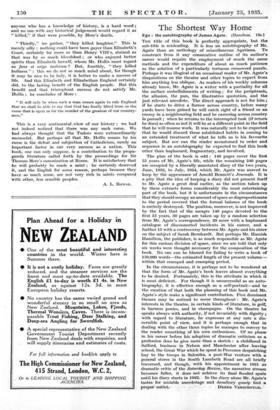The Shortest Way Home
Ego c the autobiography of James Agate. (Hamilton. 18s.) Tau title-of this book is perfectly appropriate, but the sub-title is misleading. It is less an autobiography of Mr. Agate than an anthology of miscellaneous Agatiana. To construct from it any consecutive outline of its author's career would require the employment of much the same methods and the expenditure of about as much patience as the solution of a particularly tortuous crossword puzzle. Perhaps it was illogical of an occasional reader of Mr. Agate's disquisitions on the theatre and other topics to expect from him anything less oblique. As readers of his weekly columns already know, Mr. Agate is a writer with a partiality for all the surface embellishments of writing ; for the periphrasis, the allusion, the pun, the illustrative quotation, and the just relevant anecdote. The direct approach is net for him ; if he starts to drive a furrow across country, before many yards have been gained he will catch sight of a friend or an enemy in a neighbouring field and be careering across country in pursuit ; when he returns to the interrupted task (if return he does) as often as not it will be at a different point in the field that he will resume work. It was naturally not to be expected that he would discard these established habits in coming to an extended treatment of what he tells us is his favourite subject. But nor can the render accustomed to order and sequence in an autobiography be expected to find this book other than haphazard, fragmentary, and involved.
The plan of the book is odd : 140 pages cover the first 55 years of Mr. Agate's life, while the remaining 240 pages _ are occupied by a liberally annotated diary of the two years, June, 1932, to July, 1934, which Mr. Agate was moved to keep by the appearance of Arnold Bennett's Journals. It is a pity that the idea of keeping a diary did not present itself to Mr. Agate a great deal earlier, as the section taken up by these extracts forms considerably the most entertaining part of the book, but it is unfortunate in the circumstances that they should occupy an amount of space so disproportionate to the period covered that the formal balance of the book is entirely destroyed. The position, moreover, is not improved by the fact that of the meagre 140 pages devoted to the first 55 years, 80 pages are taken up by a random selection from Mr. Agate's correspondence, 20 more with a haphazard catalogue of disconnected incidents in his career, and a further 15 with a controversy between Mr. Agate and his sister on the subject of Sarah Bernhardt. But perhaps Mr. Hamish Hamilton, the publisher, is as much responsible as Mr. Agate for this curious division of space, since we are told that only six weeks were thought necessary for the composition of the book. No one can be blamed for failing to write a book of 150,000 words—the estimated length of the present volume— within that cramped and cramping period.
In the circumstances, it is perhaps not to be wondered at that the form of Mr. Agate's book leaves almost everything to be desired. Fortunately, this is the attribute in which it is most deficient. For though it is unsuccessful as an auto- biography, it is effective enough as a self-portrait--and to the creation of that both the planning of this book and Mr. Agate's style make a significant contribution. Five dominant themes may be noticed to recur throughout : Mr. Agate's interests in the theatre, in certain kinds of literature, in golf, in harness ponies, and in champagne. On the theatre he speaks always with authority, if not invariably with dignity ; with regard to literature, he expresses at any rate a dis- cernible point of view, and it is perhaps enough that in dealing with the other three topics he manages to convey to the reader something of his own enthusiasm. Of no phase in his career before his adoption of dramatic criticism as a profession does he give more than a sketch : a childhood in Salford, business in Nelson and Manchester after leaving school, the Great War which he spent in Provence despatching hay to the troops in Salonika, a post-War venture with a general stores in the South Lambeth Road are all briefly traversed, and though, with his appointment in 1921 as dramatic critic of the Saturday Review, the narrative stream becomes fuller, it does not achieve its final flooded spate until his diary starts in 1932. In the diary alone Mr. Agate's tastes for amiable anecdotage and desultory gossip find a














































 Previous page
Previous page